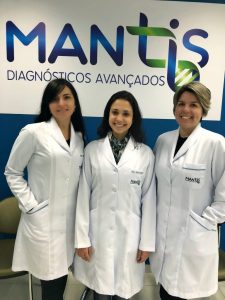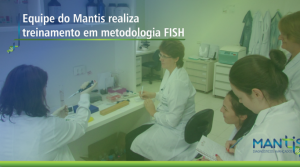This website uses cookies so that we can provide you with the best user experience possible. Cookie information is stored in your browser and performs functions such as recognising you when you return to our website and helping our team to understand which sections of the website you find most interesting and useful.
Mantis Diagnósticos participa de estudo internacional

Frequency of KRAS, NRAS and BRAF Mutations in Metastatic Colorectal Cancer in Latin America using a Fully Automated Real-Time PCR-based Mutation Analysis Platform
Elly Bender Kohnert Seidler1, Jaqueline Conceição SouzaEdy1, Heinrich Seidler1, Horacio Astudillo2, José Alí2, Héctor Eduardo Sánchez Ibarra3, Elena Yareli Gallegos González3, Hugo Alberto Barrera3, Graziele Moraes Losso4, Caroline Dias Posselt4, Meire Silva Batislela4, Jaqueline Souza3, July Rodríguez5, Jenny Avila5, Melissa Bravo5, Beatriz Helena Aristizábal6, Clara Inés Aristizábal6, Claudia Patricia Benítez6, Alejandro Ruiz-Patiño5, Andrés F. Cardona5,7,8
1Laboratory Brasiliense, Brasilia, Brasil
2Nanopharmacia Diagnóstica, México City, México
3Vitagénesis, Monterrey, México
4Mantis, Curitiba, Brazil
5Foundation for Clinical and Applied Cancer Research – FICMAC, Bogotá, Colombia
6Unigem, Medellín, Colombia
7Clinical and Translational Oncology Group, Clínica del Country, Bogotá, Colombia
8Molecular Oncology and Biology Systems Research Group, Universidad El Bosque, Bogotá, Colombia
Background: Understanding the molecular mechanisms of underlying disease has led to a movement
away from the one-drug-fits-all paradigm towards treatment tailored to the genetic profile of colorectal cancer (CRC). The Idylla™ platform (Biocartis, Belgium) is a fully automated, real-time PCR-based in vitro diagnostic system. The Idylla™ KRAS Mutation Test and Idylla™ NRAS-BRAF Mutation Test have been developed for the qualitative detection of several mutations, facilitating genetic profiling. The aim of this study was to carry out a large-scale analysis of 3.226 metastatic colorectal carcinoma cases from Brazil, Mexico and Colombia and evaluate the Idylla™ platform.
Methods: RAS panel mutations analyses were performed using the Idylla™ platform on formalinfixed
paraffin-embedded (FFPE) tissue sections. This is a simple (short hands-on time), highly reliable,
and rapid (≈2 hours turnaround time) in vitro diagnostic sample-to-result solution. The Idylla™ platform enables qualitative detection of 39 clinical relevant mutations in the KRAS and NRAS oncogenes (codons 12, 13, 59, 61, 117 and 146), and 5 mutations in BRAF codon 600 (V600E, E2, D, K and M).
Results: Valid results were obtained in 3.124 mCRC cases (96.8%) with a mean period of 3.0±1.8 days
(three quarters of the cases were reported in <5 days). Overall, 1.247 (38.6%) patients had some genomic alteration in the RAS panel and 1.877 (58.2%) were wild type. Idylla™ identified 1.044 KRAS mutated (32.4%), 80 NRAS mutated (2.6%) and 123 BRAF mutated (3.8%) cases. Idylla™ KRAS detected 704
mutations in codon 12 (67.9%), 174 in codon 13 (16.8%), 64 in codon 61 (6.2%), 43 in codon 146 (4.1%),
21 in codon 2 (2.0%) and 15 in codon 117 (1.4%). Idylla™ NRAS-BRAF also found 50 mutations in NRAS
codon 61 (62.5%), 25 in codon 12 (31.3%) and 5 in codon 13 (6.2%). Almost all BRAF mutations detected
were V600E (99.2%). Among those with KRAS mutations, the codons most frequently involved were G12D, G12V, G13D, G12C and G12A with 30.9%, 19.8%, 16.9%, 6.8% and 5.2%, respectively. The genomic distribution per country determined a lower frequency of KRAS mutations in Brazil and higher BRAF mutations in Colombia, both findings were statistically significant (p=0.001 and p=0.002).
Conclusions: The Idylla™ system is a highly reliable platform for detection of KRAS, NRAS and BRAF
mutations in CRC, providing an efficient alternative to conventional diagnostic methods in developing
countries. Distribution of mutations in the RAS pathway of patients with metastatic colorectal cancer in Latin America is similar to that previously described





